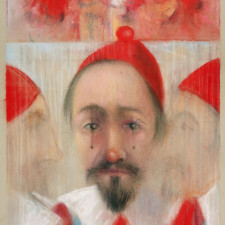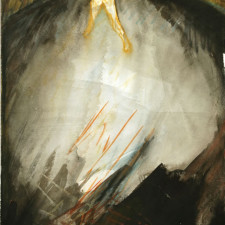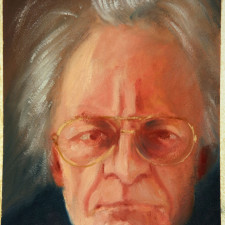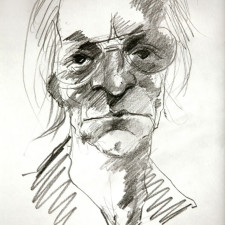Essays Yukio
Essay written for the catalogue of the Ashford Gallery posthumous exhibition of “A Selection of Works from his Studio” by John Kelly RHA, January 2009.
John Kelly periodically claimed not to like cats. Usually sparked off by the feeding ritual, he would announce that humans are to the cat no more than a giant tin-opener. “When the cat looks at you, he sees no more than a tin-opener with legs”, I was reminded regularly. I learnt not to argue back, having spent years trying to convince him the cat loved me. When Pepper the cat died aged fourteen years, John dug a deep hole in the back garden under the shade of a cotoneaster. It was a damp, grey November morning and the Angelus from Berkeley Road church reached us as we said our goodbyes to the bundled body of Pepper, acting out our parts of mourner and gravedigger by turns. A moment in time that is frozen; John hovering, shifting his feet and rubbing his hands together; his jerky movements betraying him. Later that day his fingers numb with the cold, he worked his chisel into perfectly rounded letters; Pepper’s tombstone bore her name and the date on which she died.
Yukio, our cat, was deaf. He loved travelling by bike and his head would peer out over the top of the bag as he strained to catch sight of the silent moving shapes that were cars and buses and the whole inferno of traffic that is Doyle’s Corner. On opening the yellow door of No. 12, John’s eyes would glint in secret delight at the strange feline visitor, while Mairead would delve into the recesses of the freezer to unearth some frozen fish she’d been saving for him. Making a detour through the Basin on the way back from Vincent Street, Yukio would bound ahead like a puppy, turning occasionally and looking back to make sure he wasn’t alone.
Yukio used up his nine lives at the rate of one a month. It was 4a.m. and we hadn’t seen him for over 24 hours. It wasn’t the first time he had disappeared. On pushing open the rusted gate, I sensed that he was somewhere close by and without knowing why, I followed an invisible thread that led me around the corner, past the discarded mattresses that flanked the laneway, towards Yukio. Cold and wet he bore no signs of violence, nor did he appear to have been poisoned. His white fur had absorbed the brackish water from the puddle in which he lay, making him look like a used sponge. He was buried beside the canal in a spot where once a year snowdrops bow their heads, in memory.
Last week I had a dream which tinted the day a shade I don’t yet recognise. John is seated on the steps between the landing and his upstairs bedroom. Thin and frail and trembling he is repeating over and over again that he can’t hear, can’t hear anything. That it is all silent. That there is nothing, nothing at all. Not even a distant sound. I hold him and tell him not to be afraid, which he seemed to hear as clear as day.
That dream reminded me of a living nightmare. The MaterHospital. 1975. So clearly had the patient heard the contents of the conversation between the surgeon and the doctors performing the operation on him, that he later repeated an anecdote they had told about a certain colleague renowned for stinking of whiskey while operating on patients. A specific golf club was discussed and banter was exchanged in between requests for the instruments of butchery.
“Seems to be sweating heavily, this chap,” one of the more observant among them, had announced.
(feelitallfeelitfuckfuckfuckfuckfuckfuckfuckfuckfuck)
“Must be all the stress of us poking and prodding around in here. Scalpel”.
“Heart-rate up too”
“So it is. Easy does it old boy”
General anaesthesia awareness or unintended intraoperative awareness is the current terminology for what John Kelly experienced on the operating table. His descriptions of those hours are the stuff of nightmares. The dose of analgesics was administered wrongly, leaving him with complete and absolute feeling, while the muscle relaxants administered did their job. At one end of the spectrum is compete paralysis, and at the other an unaltered sensitivity to pain. John felt everything from the first incision through to the cutting open of his innards, all the while unable to move, speak, blink, talk or scream.
He would have sweated profusely and his heart-rate would have increased dramatically causing the skin on his face, neck and upper body to go red and blotchy. Trapped inside his body he heard and felt everything.
Hours later the patient was given a tranquilizer injection to curb the roars of insults and the litany of damaging accusations that at last had their release. That same evening he stumbled down the steps of the Mater onto Eccles Street, his stitches bursting and his skinny legs bare to the knee. He had had enough of hospitals, he said.
Thirty years later and this time I am beside his hospital bed clasping his clammy outstretched hand.
“Can you see me? Can you see me? I can’t see you. Can you see me?”
A frantic repetition of words that had become devoid of all meaning. In the absence of the sense of sight he grappled with an understanding he had forgotten.
Like a child covering its face with its hands and being so sure you can no longer see her. I had never seen him cry before. His eyes, grey and flecked, seemed to search out something just above my head, looking for proof that he still existed in a world he could no longer see.
My father had temporarily lost his eyesight due to a sudden drop in blood pressure; his system had shut down any function that wasn’t crucial to his survival and we reminded him as if a child that he was there, that we could see him, that he was going to be ok. Not that we had any idea as to what was happening, nor whether he was going to be able to see again.
A red-haired man with teenage acne headed up the entourage of doctors who suddenly flurried onto the scene, white coats flapping, clipboards poised for the next task at hand. The room became crowded in a matter of seconds, the black space that met John’s empty stare now crammed with people breathing noisily and squeaky shoes and loud authoritative voices. The red-head took charge and announced loudly and with obvious panic in his voice that it was probably a blood clot which was on its way to the patient’s brain. At this point I signalled angrily that the patient was blind, not deaf. Taking the hint, Doctor kept his worst-case scenario pronouncements to himself and continued to shout at John, who, galvanized by a rising sense of indignation asked me calmly and loudly to inform Them that although he did appear to have lost his eyesight, he wasn’t deaf.
And, there was absolutely no need to shout at him like he was a fucking idiot.
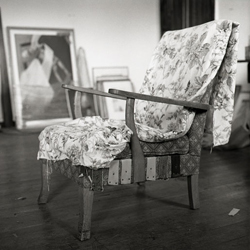 His studio was dismantled piece by piece, its layers of dust peeled away and disposed of. The skipping rope taken off the rusting hook on the back of the door, sets of fingerprints still curled around the red wooden handles from when his boxer’s skip had kept him warm. It occurs to me that his fingerprints cover every surface like intricate etchings, but will never again leave their mark afresh. Hands that once squeezed tubes lifeless have left a scattering of paints and brushes. There is a single white hair strewn across a blank page, as if inviting colour to be daubed in its wake. Shadowy corners of the room are tinged by his smell, where his shirts and trousers are a bundle of faded greens and purples.
His studio was dismantled piece by piece, its layers of dust peeled away and disposed of. The skipping rope taken off the rusting hook on the back of the door, sets of fingerprints still curled around the red wooden handles from when his boxer’s skip had kept him warm. It occurs to me that his fingerprints cover every surface like intricate etchings, but will never again leave their mark afresh. Hands that once squeezed tubes lifeless have left a scattering of paints and brushes. There is a single white hair strewn across a blank page, as if inviting colour to be daubed in its wake. Shadowy corners of the room are tinged by his smell, where his shirts and trousers are a bundle of faded greens and purples.
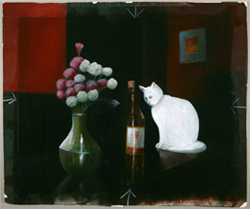 John Kelly’s last painting before he died still stood on the easel, finished but untitled. A still life in oils, Yukio the deaf white cat sits on a table with a wine bottle and a glass vase of pink and white carnations. His whiteness luminous against the dark background, he appears to hover; ghostlike. With human features and shining eyes fixed, Yukio is statuesque in his silent, immortal world.
John Kelly’s last painting before he died still stood on the easel, finished but untitled. A still life in oils, Yukio the deaf white cat sits on a table with a wine bottle and a glass vase of pink and white carnations. His whiteness luminous against the dark background, he appears to hover; ghostlike. With human features and shining eyes fixed, Yukio is statuesque in his silent, immortal world.
Caitríona Kelly, January 2009

